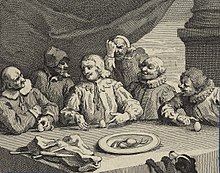Egg of Columbus
The egg of Columbus is a concept defined by the Dictionary of the Spanish language as a 'thing that appears to be very difficult but turns out to be easy when knowing its artifice'. Girolamo Benzoni in his History of the New World (Venice, 1565) tells the following story:
While Christopher Columbus was at the table with many Spanish nobles, one of them said to him, ‘Mr. Columbus, even if your mercy had not found the Indies, we would not have missed a person who would have embarked on an adventure similar to his, here, in Spain which is a prodigal land in great men highly understood in cosmography and literature.” Columbus did not answer these words, but, having asked to bring an egg, he placed it on the table and said, ‘Lords, I bet with any of you that you will not be able to put this egg standing as I will, naked and without any help.’ They all tried without success. When the egg returned to Columbus, he was subtly beaten against the table by crushing the curvature of his base, which allowed him to stand. All those present were confused and understood what they wanted to say: that after having done and seen the feat, anyone knows how to do it.
From this story comes the popular saying that "Columbus was the first man who... laid an egg upright" and that the expression "like Columbus's egg" is used to describe something that seemed complex or difficult and that is simple or straightforward once understood.
Fifteen years earlier, Giorgio Vasari told a similar story in his work Lives of Painters, Sculptors and Architects (Florence, 1550). The young Italian architect Filippo Brunelleschi had designed an extremely large and heavy for the cathedral of Santa Maria del Fiore, and the rulers of the city asked to be shown the model. He refused, proposing instead that whoever managed to put an egg upright on a marble table would build the dome, because that way the talent of each one would be discovered. All the masters tried but none succeeded, and when Filippo's turn came, he delicately hit the egg against the marble, slightly damaging the curvature of its base, and managed to leave it standing. The others protested that they could have done the same, and Filippo replied with a laugh that they could have built the dome too if they had seen the model or the design.
Both stories are of doubtful credibility, but they are clever and illustrate the point well, which is probably why they caught on.
Contenido relacionado
Hail, oh homeland
400
1898
